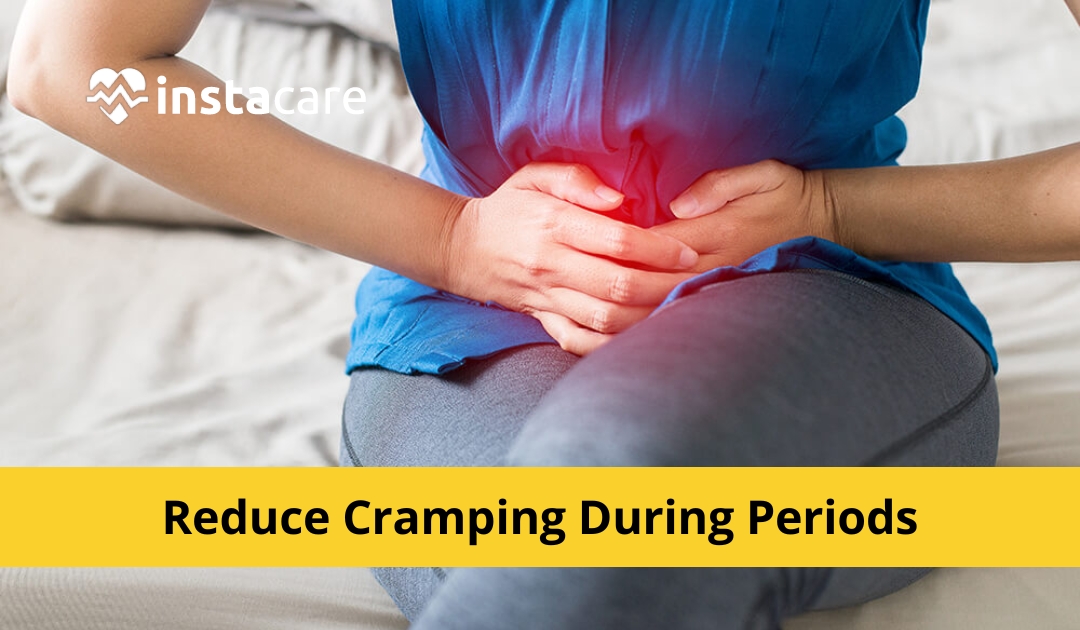Having menstrual cramps can be incredibly uncomfortable and disruptive to your daily activities. Instead of turning to medication, however, there are some simple steps that you can take to reduce the intensity of cramping during your period without resorting to pills or other medical interventions.
In this blog post, we’ll discuss exactly how you can manage painful menstrual cramps in a natural way—so that you don’t have to suffer unnecessarily each month. Read on for plenty of tips and tricks so that next time Aunt Flo comes around, you’ll know just what do keep your symptoms under control!
What is cramping during periods?
Cramping during periods is a common, yet potentially uncomfortable experience for many women. Generally cramping happens when the uterus contracts and tightens the muscles around it to expel its lining. This can cause cramps that may range from mild sensation to severe pain in areas like your lower abdomen, lower back and even down into your legs.
There are numerous potential causes of cramping during periods so it is best to consult a doctor or gynecologist for proper diagnosis and treatment. In addition to medications such as birth control, there are also natural solutions like heat therapy or yoga that women can try for relief from cramps caused by their monthly cycle.
What causes cramping during periods?
Cramping during periods is a common and often debilitating experience for women of all ages. It is caused when hormones such as progesterone cause the uterus to cramp and contract. This cramping often leads to pain in areas like the lower abdomen, back, and thighs. In some cases, cramping can be severe enough to disrupt daily routines or activities.
Fortunately, cramping usually becomes less intense as a woman's body adjusts to changes in hormone levels throughout her menstrual cycle. Additionally, many women find that over-the-counter medications can help with cramp relief during their period. Taking these medications with regularity may help reduce cramping intensity over time.
Symptoms of cramping during periods
1- Nausea
Nausea can be an uncomfortable and unwanted feeling that can be accompanied by cramping during one's menstrual period. While it is not dangerous, it can cause you to feel sluggish and unwell. Common treatments for nausea include hydration, rest, over the counter medications like ibuprofen or antacids, and avoiding triggers.
These may include certain types of food or smells as well as physical activity. If cramps and/or nausea become particularly bothersome due to your period, your doctor may be able to recommend a course of treatment such as hormonal birth control or lifestyle changes like drinking more water or exercising regularly.
2- Loose stools
Loose stools can be an irritating and disruptive issue. The cramping that typically accompanies loose stools can become incredibly uncomfortable during periods of time, making it difficult to focus anywhere else. While the cramping can often break apart into shorter cramps, it still has a big impact on many people's day to day lives.
Knowing the causes and triggers of loose stools is the best way to manage them - common causes include certain medications, changes in diet, and stress or anxiety. It is important to seek medical advice should your symptoms persist, as they could be indicative of another underlying condition.
View More: Brown Spotting Instead Of Period
3- Headache
Headaches are one of the most common affections today, with numerous potential causes. Although sometimes resulting from stress or physical activity, headaches can also have their origin in cramping during periods, when the uterus walls contract involuntarily. Women are also more prone to suffer from them and specific types of headaches such as migraine, tension headaches, and cluster headaches.
However, besides cramping as a possible source of headaches during menstruation, increased hormonal fluctuations and sensitivities to food can also trigger a headache. Consequently, being aware of the changes in your body and knowing how to act - such as taking painkillers or resting - might be an interesting strategy in order to alleviate this uncomfortable feeling.
4- Dizziness
Dizziness can be a very uncomfortable and disorienting feeling that gets in the way of daily activities. It is very often associated with cramping during periods, which can indicate an underlying medical condition such as anemia. It may also be caused by the hormonal changes that occur during menstruation.
If you are experiencing this symptom it is important to seek medical attention, especially if it has not gone away after a few days or if it is accompanied by any other symptoms or signs like nausea or blurred vision.
Risk factors
With cramping during periods, there are a number of risk factors to consider when assessing everyday discomfort. Some of these risks include underlying medical conditions such as endometriosis, uterine fibroids, or underlying infections like pelvic inflammatory disease. Other factors may include certain lifestyle choices like lack of exercise or a diet low in calcium and magnesium.
Additionally, stress is undoubtedly a contributing factor, as cramps tend to be exacerbated with higher levels of stress in both menopausal and pre-menopausal women. It is important to address these risk factors to maintain comfort and reduce the frequency of cramps during menstruation; consulting your physician for further advice is highly recommended.
What to do when cramping during periods?
Cramping during periods can be an uncomfortable and distracting experience. The key to relieving cramps is to remain as calm and relaxed as possible. A simple but effective remedy for cramping is to take deep breaths. Inhaling deeply, holding the breath for a few moments, and then slowly exhaling will help the cramps become more manageable.
In addition, gentle exercise such as walking or stretching your legs can promote comfort while cramping. Other helpful tips include staying hydrated and avoiding sugary drinks or processed foods that can cause cramps to worsen. Taking medications such as ibuprofen or acetaminophen may also provide temporary relief from cramps if necessary. Remember that cramping is a natural part of the menstrual cycle and there are ways to manage it with simplicity and ease!
View More: Stomach Pain In Pregnancy What To Know
Is cramping normal during periods?
Cramping during periods is a very normal and common occurrence. Most women experience cramps in the lower abdomen, and they can last anywhere from a few hours to the duration of their period.
While cramping during menstruation is not considered dangerous, it can still be very uncomfortable. There are certain lifestyle habits that can help lessen cramping, such as regular exercise, adequate sleep, and eating healthy foods rich in iron and antioxidants.
Additionally, medication like ibuprofen can also help reduce cramping if needed. It is important for all women to become more familiar with cramps associated with their period and take action to ensure their health and comfort levels are met.
How to Reduce Cramping During Your Periods?
Cramping is a common, yet uncomfortable symptom of periods. But with the right technique, cramps can be reduced without taking any medications. One of the ways to reduce cramping during your period is to change your diet. Eating foods that are rich in magnesium and calcium such as leafy greens and dairy products can help soothe cramps.
Additionally, drinking lots of water helps flush out toxins in the body. Furthermore, exercise can help reduce cramping by increasing blood flow and releasing endorphins which can act as natural pain relief.
Finally, gentle stretching regularly throughout the day may also reduce cramping symptoms by loosening up tense muscles. Incorporating these various techniques into your routine might just be a great way to alleviate cramping without medication!
Conclusion
Making lifestyle changes to manage cramps and other uncomfortable symptoms associated with menstruation can be a great way to feel more comfortable and confident during this natural process. The suggestions discussed in this blog post can help you find relief of cramping without the need of medication. Keep in mind that if your discomfort persists it might be worth speaking with your health care provider about what methods may best meet your needs.
When it comes to fighting off period-related cramps, know that you have many tools at your disposal; a combination of diet and lifestyle changes can leave you feeling empowered and ready to take on whatever life throws at you. Periods are natural, normal, and sometimes even helpful - let’s start treating them as such. Let's challenge the stigma by openly talking about ways we can ease our discomfort during our period days so we can make the best out of them!
Please book an appointment with the best Gynecologist in Lahore, Karachi, Islamabad, and all major cities of Pakistan through InstaCare, or call our helpline at 03171777509 to find the verified doctor for your disease.
Source: https://instacare.pk/blog/how-to-reduce-cramping-during-periods












